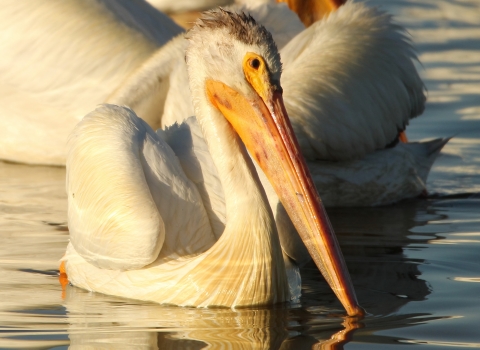We at the U.S. Fish and Wildlife Service know that America’s native bees and other pollinators continue to need everyone’s help. Through a grant under the Cooperative Endangered Species Conservation Fund, we awarded more than $778,000 to benefit imperiled bumble bees. This funding supports the development of a nationwide conservation plan to secure and maintain habitat for six imperiled bumble bee species on potentially millions of acres of utility, energy and transportation lands across the lower 48 states. The plan will be developed in partnership by the University of Illinois-Chicago and the Wisconsin Department of Natural Resources. The partners will provide matching funds for a total project amount of $1.04 million.
In late 2024, the partners will submit for Service approval nationwide agreements under the Endangered Species Act to guide conservation for bumble bees. Voluntary conservation measures in the agreements aim to sustain and expand high-quality habitats that provide diverse foraging and nesting habitat, while also reducing threats posed by habitat degradation, pesticides, diseases and climate change climate change
Climate change includes both global warming driven by human-induced emissions of greenhouse gases and the resulting large-scale shifts in weather patterns. Though there have been previous periods of climatic change, since the mid-20th century humans have had an unprecedented impact on Earth's climate system and caused change on a global scale.
Learn more about climate change . This effort builds upon the program already in place for the Candidate Conservation Agreement with Assurances for Monarch Butterfly on Energy and Transportation Lands.
To develop these agreements the partners will lead facilitated conversations between the U.S. Fish and Wildlife Service; state and local highway agencies; and utility and energy companies. Safe harbor agreements would target the rusty patched bumble bee and Franklin’s bumble bee, which are both federally endangered. Candidate conservation agreements with assurances would benefit several other species facing population declines, including the American bumble bee, variable cuckoo bumble bee, western bumble bee and Suckley’s cuckoo bumble bee. One anticipated outcome is an application that may result in an Enhancement of Survival permit issued with a final agreement. Enhancement of survival permits are issued to non-federal landowners participating in a Safe Harbor Agreement or Candidate Conservation Agreement with Assurances . Landowners who participate in these voluntary agreements take actions to benefit species while also receiving assurances that they will not be subject to additional regulatory restrictions as a result of their conservation actions.
A Safe Harbor Agreement is a voluntary agreement involving private or other non-federal property owners whose actions contribute to the recovery of federally listed endangered or threatened species. The agreement with the Service provides participating property owners with formal assurances they will not be required to conduct additional management activities beyond the actions they are already taking to contribute to the recovery of listed species.
Candidate conservation agreements with assurances are formal, voluntary agreements between the Service and landowners to conserve habitats that benefit at-risk species. This conservation agreement is for non-federal partners only and provides assurances to participants (in the form of an “enhancement of survival permit”) that no additional conservation measures will be required of them if the covered species later becomes listed under the Endangered Species Act.
If approved by the Service, landowners and managers that carry out eligible activities on utility, energy and transportation lands can enroll in the program created through the agreement and voluntarily commit to measures that will contribute to the conservation of the covered species in return for formal assurances. Depending on the location, this project could reduce the need for enrolled partners to submit individual permit applications for review, which can benefit small, rural utilities and local road authorities.
Using Cooperative Endangered Species Conservation Fund grants to develop Candidate Conservation Agreements with Assurances and Safe Harbor Agreements is new this year, as the grant criteria have been expanded. Overall, the Service also approved more than $9.1 million in grant awards to eight states and Guam under the Conservation Planning Assistance Grant Program. Funding awarded through this program may be used to support the development, renewal or amendment of habitat conservation plans, safe harbor agreements and candidate conservation agreements with assurances. Eligible activities include document preparation, public outreach, baseline species surveys, habitat assessments, inventories and environmental compliance. This year’s awards will support 15 conservation planning efforts covering 135 listed, candidate and at-risk species.
Learn more about the Cooperative Endangered Species Conservation Fund grant programs.
The Endangered Species Act provides a critical safety net for North America’s native fish, wildlife and plants. The Service is working to actively engage conservation partners and the public in the search for improved and innovative ways to conserve and recover imperiled species. Learn more about our endangered species program.



